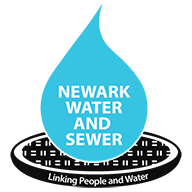Upgrades at Pequannock Water Treatment Facility: A continued investment in Newark’s water
NJDEP Commissioner LaTourette (far left) and environmental engineers holding wrenches at the Pequannock Water Treatment Facility after the announcement of the plant upgrades, April 2022.
When Erica Espiritusanto finishes her day monitoring water chemistry and collaborating with consultants, she reminds herself that she is treating the very water that she, her family, and her community drink back home in Newark, New Jersey.
“Knowing that we’re upgrading the plant to provide better drinking water to the people in the space where I live and I grew up in -- it's an amazing feeling,” she said.
Born and raised in Newark, she is one of eight environmental engineers who operate and manage the Newark Water & Sewer Utilities’ water treatment plant at Pequannock, the City’s largest.
Young engineers like Erica do unseen work to chemically treat and disinfect the water that is delivered to bathroom and kitchen sinks all over the City of Newark, which delivers on the Baraka Administration’s promise to give residents the safest and cleanest water possible.
Two years ago, Mayor Ras Baraka and Newark Water & Sewer Utilities Director Kareem Adeem announced a $23 million upgrade to the Pequannock Water Treatment Facility, including state-of-the-art technology in both filtration and AI systems. The new upgrades, the largest since the plant came online in 1989, will also restore the maximum production capacity to 60 million gallons of water per day.
The Pequannock Water Treatment Plant (PWTP) is located in West Milford just east of the Charlotteburg Reservoir, the largest of the five reservoirs that service the City of Newark. PWTP supplies water to an estimated 350,000 customers across the North Jersey region.
Among the major upgrades at the plant include the installation of 60 new valve replacements for better control of water flow and volume, and nine pumps used to clean filter, pump sludge, and carry wastewater. The SCADA (supervisory control and data acquisition) will also be upgraded for improved security and control of plant operations and will be relocated to the first floor of the plant.
The ongoing upgrades at the Pequannock Water Treatment Plant are the next steps the City of Newark is taking to overhaul its aging water infrastructure. Since 2014, the Baraka administration has invested over $350 million in all water infrastructure upgrades thus far.
The project follows the completion of the City’s nationally recognized Lead Line Replacement program, in which more than 23,000 lead service lines were removed and replaced with copper pipes.
The Lead Service Line Replacement (LSLR) program’s groundbreaking event where the first lead lines were replaced with copper lines, March 13, 2019 (Ed Murray, NJ Advance Media).
In a visit here in February 2022, Vice-President Kamala Harris called Newark “the model city” for lead line replacement.
“We got a lot of attention for that,” said Director Adeem, “and both Mayor and I testified before Congress about our success and how it can be a blueprint for other cities”.
Water & Sewer Director Kareem Adeem announcing the Pequannock Water Treatment Plant Operational Upgrades, April 2022.
“But the story doesn’t end there,” he said. “As a city-owned utility, we are still doing the work necessary to ensure our water infrastructure is strong and our water is safe for many years to come”.




